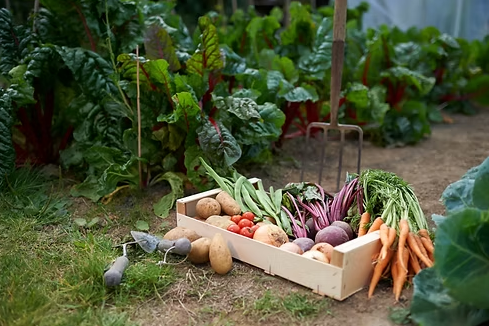
Associate of Science in Plant-Based Healing
Duration: 2 years (4 semesters)
Credits: 60–64 credit hours
Delivery: Online
Credential: Associate Degree
🎓 Program Description:
The Associate of Science in Plant-Based Healing is an interdisciplinary program designed for individuals interested in the therapeutic applications of botanicals, herbs, and plant-derived substances. It combines foundational scientific principles with traditional healing practices from around the world. Students will gain hands-on knowledge in herbal medicine, plant identification, pharmacognosy, holistic nutrition, and natural health strategies, equipping them for careers in wellness, holistic health, herbal retail, and further study in natural or integrative medicine.
🧪 Program Learning Outcomes:
Graduates of this program will be able to:
-
Identify and utilize medicinal plants and herbs for therapeutic purposes.
-
Explain human anatomy, physiology, and the body’s response to natural healing.
-
Prepare and apply plant-based remedies safely and ethically.
-
Assess client wellness needs and suggest plant-based interventions.
-
Evaluate scientific and cultural evidence supporting plant-based therapies.
📘 Course List & Credit Breakdown:
| Course Title | Credits |
|---|---|
| General Education Courses | |
| English Composition I & II | 6 |
| Introduction to Psychology or Sociology | 3 |
| Basic Human Biology or Anatomy & Physiology I | 4 |
| College Mathematics or Quantitative Reasoning | 3 |
| Environmental Science or Ecology | 3 |
| Core Plant-Based Healing Courses | |
| Introduction to Plant-Based Healing | 3 |
| Herbal Materia Medica I | 3 |
| Herbal Materia Medica II | 3 |
| Botany & Plant Identification | 3 |
| Herbal Medicine Preparation and Formulation | 3 |
| Holistic Nutrition and Healing Foods | 3 |
| Traditional Healing Systems (e.g., Ayurveda, TCM, Folk) | 3 |
| Introduction to Aromatherapy and Essential Oils | 3 |
| Pathophysiology and Natural Health | 3 |
| Capstone & Electives | |
| Internship or Practicum in Herbalism | 3 |
| Capstone Project: Healing with Plants | 3 |
| Elective: Medicinal Mushrooms, Cannabis Science, etc. | 3 |
| Total Credit Hours | 60–64 |
🌿 Sample Course Description & Module Breakdown
Course Title: Introduction to Plant-Based Healing
Credits: 3
Course Description:
This foundational course explores the history, philosophy, and science behind plant-based healing practices across cultures. Students will learn basic concepts of herbal medicine, the role of plants in health and wellness, and how botanical therapies are integrated into modern complementary medicine.
Course Modules:
-
History & Evolution of Plant-Based Healing
-
Ethnobotany and ancient traditions
-
Indigenous knowledge systems
-
From folk remedies to modern herbalism
-
-
Foundations of Herbal Therapeutics
-
Primary plant actions: adaptogens, nervines, etc.
-
Safety and toxicity
-
Legal and ethical considerations
-
-
Plant Constituents and How They Work
-
Alkaloids, flavonoids, saponins, tannins
-
Mechanisms of action in the body
-
The synergy of whole plant medicine
-
-
Global Healing Systems
-
Ayurveda, Traditional Chinese Medicine (TCM), Western Herbalism
-
Healing energetics: hot/cold, wet/dry, yin/yang
-
-
Plant-Based Healing in Contemporary Practice
-
Herbalism and integrative health
-
Holistic wellness coaching
-
Case studies in chronic illness management
-
Course Title: Herbal Medicine Preparation and Formulation
Credits: 3
Course Description:
This hands-on course teaches students how to prepare herbal remedies in various forms, including teas, tinctures, oils, salves, syrups, and capsules. Emphasis is placed on correct dosage, safety, storage, and formulation strategies based on therapeutic goals.
Course Modules:
-
Introduction to Herbal Preparations
-
Solvent types and extraction principles
-
Weight-to-volume ratios
-
Cleanliness and preservation
-
-
Teas, Decoctions, and Infusions
-
Differences and preparation methods
-
Suitable herbs for each form
-
Medicinal applications
-
-
Tinctures and Extracts
-
Alcohol-based vs glycerin-based
-
Folk vs weight-based method
-
Labeling and dosage
-
-
Topical Applications: Salves, Oils, Poultices
-
Herbal oils and infused creams
-
Use for skin, wounds, and inflammation
-
Safety for sensitive skin
-
-
Capsules, Syrups, and Custom Blends
-
Formulating multi-herb remedies
-
Sugar/alcohol-free alternatives
-
Herbal "first-aid" kits
-
Course Title: Holistic Nutrition and Healing Foods
Credits: 3
Course Description:
This course explores the medicinal role of food in promoting health, with a focus on plant-based nutrition. Students learn about therapeutic diets, anti-inflammatory foods, and using food as medicine to prevent or manage chronic conditions.
Course Modules:
-
The Science of Food as Medicin
-
Plant-Based Diets for Healt
-
Healing Through Food: Conditions and Protocol
-
Superfoods, Herbs, and Functional Nutritio
-
Practical Meal Planning for Wellness
Course Access
You'll be added to this within 24 to 48hrs after purchase. Please make sure you put a working email address as your login will be emailed to you.
Program Duration and Study Hours
Duration: 2 Years
All online courses must be completed within the allotted time
If you have not completed your course within allotted time, we reserve the right to restrict access to your course.
For questions regarding this policy, please contact us
Accreditation Status
This course is not currently accredited
Future Plans for Accreditation Status
Yes, though this program is not fully accredited we do have future plans to apply for accreditation for this program.
Awards
Associate degree Diploma of Completion



